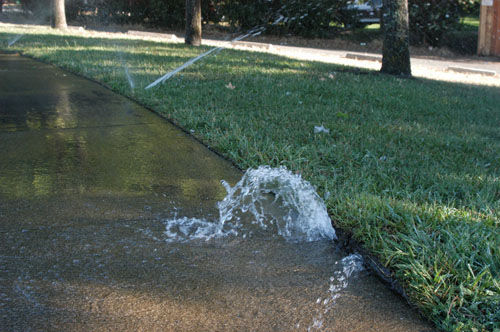What Typically Breaks Over the Winter Time in Sprinkler Systems?
- Justin Lindstrom
- Feb 23, 2024
- 2 min read
Winter can be a challenging time for sprinkler systems, with cold temperatures and harsh weather putting a strain on the components. In this article, we will explore some of the common issues that arise during the winter months and how you can prevent them from causing costly damage to your system.
Above Ground Pipes That Were Not Drained Properly

One of the most common problems that occur in sprinkler systems over the winter is damage to above-ground pipes that were not drained properly before the cold weather set in. When water freezes inside the pipes, it expands, causing them to crack and break. This can lead to leaks and system malfunctions when you try to use the sprinklers again in the spring. To prevent this issue, make sure to fully drain all of the water from your system before the first freeze of the season. This can be done by turning off the water supply to the sprinklers and running them until no more water comes out. You can also blow out the lines with an air compressor to ensure that all water has been removed.
Run Over Sprinkler Heads Along Driveways and Roadways
Another common problem that occurs over the winter is damage to sprinkler heads that have been run over by cars or other vehicles. This can happen when the heads are located too close to driveways or roadways, making them vulnerable to damage from passing vehicles. When a sprinkler head is broken, it can lead to water waste, uneven coverage, and costly repairs.To prevent this issue, make sure to install protective barriers around your sprinkler heads to keep them safe from vehicles. You can also mark the locations of the heads with small flags or stakes to make sure that they are easily visible and avoid getting run over accidentally.
Find Problems That Weren't Addressed in Previous Year but Were Never Addressed
As the winter months come to an end and you begin to start up your sprinkler system again, it is common to discover problems that were not addressed last year but went unnoticed until now. This can include issues such as leaks, clogged nozzles, or malfunctioning valves that were not apparent when the system was shut down for the season. To prevent these issues from causing further damage to your system, make sure to conduct a thorough inspection of all components before turning your sprinklers back on. Look for any signs of damage or wear and tear, and make any necessary repairs or replacements to ensure that your system is running smoothly.
In conclusion, winter can be a challenging time for sprinkler systems, but by taking proactive measures to protect your system from common issues, you can avoid costly repairs and ensure that your lawn stays healthy and green when spring arrives.




Comments